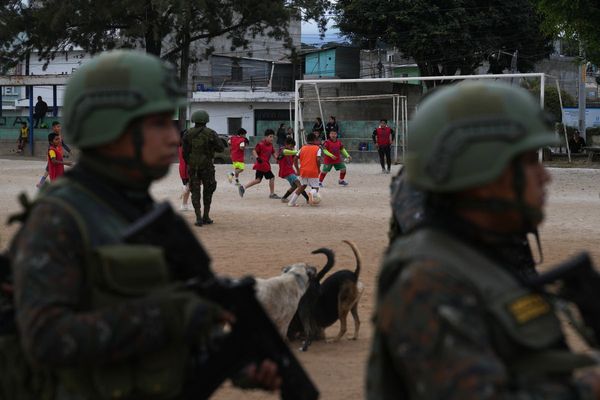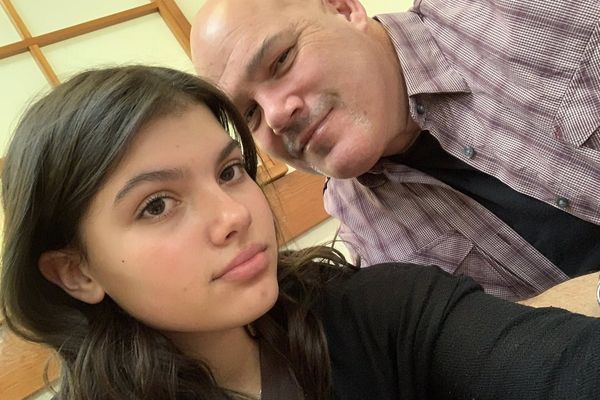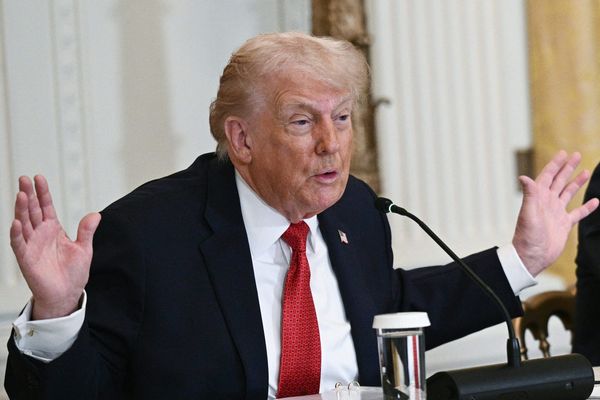
Yes campaign leader Rachel Perkins stood up on Wednesday with 10 prominent central Australian Aboriginal women and two Aboriginal men in the centre of Mparntwe (Alice Springs) to vocalise their support for an Indigenous Voice to Parliament.
“What happened here today is that my community, this community I’m proud of, gathered with 12 hours’ notice. And all the women who I greatly admire, sat down here and said their piece about why they support the Voice,” Perkins, an Arrernte and Kalkadoon woman and multi-award-winning filmmaker, told Crikey after the event.
“If the media and if Australia cannot hear that, well, that just shows you why we need a Voice, doesn’t it?”
The list of names speaking in favour of a Yes vote included founding chair of Children’s Ground and 2023 Male Elder of the Year William Tilmouth, deputy chair of the Central Land Council Barbara Shaw, co-ordinator of the Tangentyere Women’s Family Safety Group Shirleen Campbell, multiple Traditional Owners, young leaders, and guest Indigenous activist Noel Pearson.
Advertised as a media “doorstop”, it drew a community crowd of around 300 that was dotted with “Vote Yes” T-shirts and signs.
Arrernte elder and Mparntwe Traditional Owner Felicity Ngala Hayes opened with a Welcome to Country in language, where she told the crowd she was still fighting for her home and her family: “We want water and power and we want more houses. I have a lot of family and a lot of generations — my children, my children’s children, and the next generation coming.”
She invited the nation to walk with Indigenous people — “alongside us, not before us or behind us” — so that decisions were not made without Aboriginal voices and knowledge.
Perkins said Hayes had been waiting for more than four decades for her Country to be returned, and despite her status as a Traditional Owner she was still living with her family in corrugated shacks on the dirt: “No running water, no electricity. She’s a traditional owner of Alice Springs. How can that happen in this country? … If we had a Voice maybe they would listen.”
The message from former CEO of Ngaanyatjarra Pitjantjatjara Yankunytjatjara (NPY) Women’s Council, Ngaanyatjarra and Karonie woman Andrea Mason was blunt. “I’m voting Uwa, Yes,” she said, adding that it was an easy choice given all four NT land councils had backed the Voice along with “one of the most powerful women’s organisations in Australia” — NPY Women’s Council.
Co-coordinator of the Tangentyere Youth Safety Group and fifth generation town camper Connie Shaw told the crowd that as a young person, she didn’t want to fight the fight being fought today in another 50 years: “It needs to happen because we’ve been here for 65,000 years and we’re not going anywhere. As a young person standing here today, I’m not gonna go anywhere. I’m going to keep fighting the fight that I’m doing for our next generation.”

Domestic violence advocate, Warlpiri and Arrernte woman Shirleen Campbell detailed the NT’s increasingly high rates of domestic and family violence (outstripping the rest of the nation by a factor of seven), slow police responses, and inundation of women’s shelters as reasons why Indigenous people need a Voice: “The No vote means to vote more of the same — more women and children lost to family and domestic violence. To vote Yes means hope and change.”
Tilmouth, an Arrernte man, gave three reasons for a Yes vote. He said it was owed to those Elders that fought for Indigenous rights but never got to see their voices heard in Parliament, because the status quo had failed, and he was tired of the “negative diatribe” pouring out of Canberra and the southern states day in and out: “It is wrong.”
Executive director of policy at the Central Land Council (CLC), Wardaman woman Josie Douglas said a Voice was an opportunity to “correct the power imbalance” in Indigenous policy making currently led across government, Parliament, the executive, ministers and chiefs of staff by “non-Aboriginal bureaucrats in Canberra who have very little experience of remote communities”. As a policymaker herself, she said it was near impossible to shift, tweak, or change anything rolled out in the bush “causing harm on remote communities”.
“Whether you’re talking to the chief of staff, a senior policy adviser, change does not come easy in terms of social policy for remote communities,” Douglas said.
Barbara Shaw, a Kaytetye, Arrernte, Warramunga and Warlpiri woman, reeled off a list of sub-par services and living conditions, including no teachers in community schools, no doctors or nurses in health clinics, unacceptable housing, deteriorating health due to high food prices and stores that don’t run a seven-day service. She said it was “disgusting” to have an Aboriginal No campaigner of Warlpiri descent — Senator Jacinta Nampijinpa Price — living in this town: “She knows how important the Voice to Parliament is to Aboriginal people and Torres Strait Islanders across the country … She knows how important it is for Yuendumu people, Warlpiri people living at Yuendumu.”
Price was stationed a couple of hundred metres away outside the Todd Mall polling booth, where she handed out “How to vote No” pamphlets. Kitted out in “vote No to the Voice of division” merchandise, the Northern Territory senator pitched her No case to an audience via a Facebook livestream.
She claimed the Yes event was an attempt to “intimidate” her and spruiked false claims that the campaign had paid interstate “ring-ins” $60 an hour to build a crowd.
“They’ve never intimidated me before, and they’re not going to start now,” she said via video. “I’ll be here for the next few days. And if you mob want to intimidate me, I’m going to stand my ground.”

Pearson spoke last and told the crowd that the Voice had nothing to do with national division — he said that was the work of petty politics on the part of the Coalition which was bitter about losing last year’s federal election.
“That is what the conservatives are complaining about. They’re complaining about the fact that Labor won office according to our normal election rules,” he said. “They’ve been on a brutal campaign to destroy our referendum because they want to destroy the Labor government. That’s the truth. And we’ve been unable to prevail upon them with the plea that they leave the federal election campaign to the next federal election.”
Pearson added that for nine years there was bipartisan support for the Voice, with most of its work funded, done, and signed-off under a Coalition watch — “four governments, five parliamentary terms, three parliamentary committees appointed by them” — but in the absence of a government-wide endorsement, his appeal was to the Australian people to “rise above the politics” and the politicians “trashing this opportunity”.
After the long list of Indigenous leaders had each said their piece, NT Chief Minister Natasha Fyles stood briefly in front of the cameras to field some questions, but Perkins told both Fyles and media that the moment was “not really about politicians”.
Her message was clear: “If you don’t care, just vote Yeah.”







